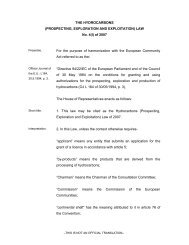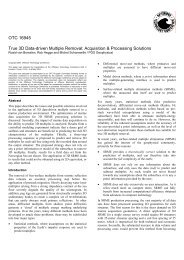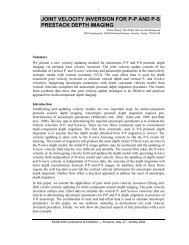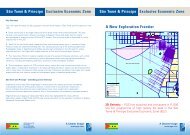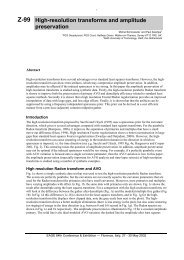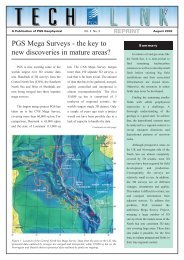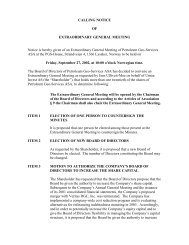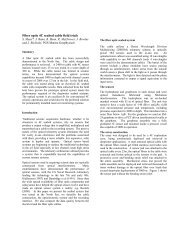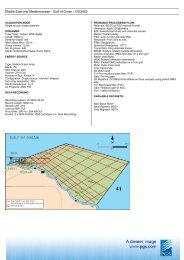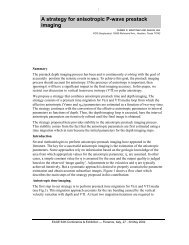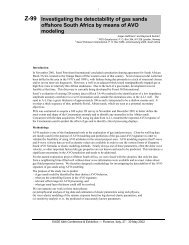Annual Report 2011 - PGS
Annual Report 2011 - PGS
Annual Report 2011 - PGS
You also want an ePaper? Increase the reach of your titles
YUMPU automatically turns print PDFs into web optimized ePapers that Google loves.
Introduction to<br />
Business Units<br />
<strong>PGS</strong> allocates its<br />
seismic acquisition<br />
capacity between Marine<br />
Contract and MultiClient<br />
assignments — in order to<br />
maximize profitability<br />
Proactive Capacity<br />
Allocation to Optimize<br />
Profitability<br />
Petroleum Geo-Services is a focused marine<br />
geophysical company. Noted for fleet efficiency<br />
and technological innovation, <strong>PGS</strong> ranks<br />
among the world’s three largest marine seismic<br />
companies.<br />
<strong>PGS</strong> provides a broad range of geophysical and<br />
reservoir services worldwide and is organized<br />
into four business units: Marine Contract,<br />
MultiClient, Operations, and Data Processing &<br />
Technology.<br />
The business model of Marine Contract is<br />
acquiring and processing seismic data under<br />
exclusive contracts with individual customers,<br />
such as oil and natural gas companies and<br />
governments. Seismic data is vital to them; key<br />
uses are to identify structures that may contain<br />
hydrocarbons, determine the size of reservoirs<br />
and optimize reservoir production. A highly<br />
efficient seismic fleet and advanced acquisition<br />
technologies are major <strong>PGS</strong> competitive<br />
advantages.<br />
Acquisition and processing is also conducted<br />
for <strong>PGS</strong>’ library of MultiClient field surveys.<br />
Under this business model, <strong>PGS</strong> invests in<br />
MultiClient seismic surveys and the processed<br />
data sets and images are marketed to multiple<br />
customers on a non-exclusive basis. MultiClient<br />
has two revenue sources: pre-funding and<br />
late sales. Customers pre-funding surveys<br />
commit to buying into the survey before and<br />
while the data are acquired and processed.<br />
Late-sales customers purchase the data when<br />
it has become a part of the MultiClient library<br />
of acquired and processed data. Reservoir<br />
Services consulting is a part of the MultiClient<br />
business unit. Reservoir Services comprises<br />
an industry-leading team of subsurface<br />
and production geoscientists providing<br />
interpretation and reservoir characterization<br />
expertise to <strong>PGS</strong> and external customers.<br />
The Operations business unit supports<br />
Marine Contract and MultiClient with reliable<br />
and efficient production capacity as well as<br />
resource planning, fleet renewal and expansion<br />
strategies.<br />
Data Processing & Technology is managed as<br />
a separate business unit due to its distinctive<br />
specializations. The business unit has two<br />
departments: DATA PROCESSING provides a<br />
full range of processing, advanced imaging and<br />
reservoir-related processing services to a global<br />
exploration and production customer base<br />
and to <strong>PGS</strong>’ MultiClient library and regional<br />
MegaSurveys. GEOSCIENCE & ENGINEERING<br />
constitutes <strong>PGS</strong>’ research and development<br />
center. Core projects are GeoStreamer dualsensor<br />
streamer technology, survey fleet<br />
efficiency, high-end imaging and automation,<br />
and electromagnetic (EM) acquisition research.<br />
Proactive Allocation of Capacity<br />
<strong>PGS</strong> allocates its seismic acquisition capacity<br />
between Marine Contract and MultiClient<br />
assignments — in order to maximize<br />
profitability. The annual budgetary vessel<br />
allocation is based on the relative strength of<br />
the market, geographical focus and specific<br />
projects. A key decision criterion for MultiClient<br />
investments is whether the project delivers a<br />
risk-adjusted profitability that, on a discounted<br />
basis, compares favorably to use of the<br />
capacity for contract work. In a weak market,<br />
the margins from good MultiClient projects are<br />
on average higher than in the contract market,<br />
so more capacity is allocated to MultiClient.<br />
To reduce exposure to the cyclical nature of<br />
the contract market, <strong>PGS</strong> will allocate more<br />
capacity to solid MultiClient projects with high<br />
pre-funding levels to optimize profitability and<br />
cash flow when the contract market is weak.<br />
This strategy results in an internal competition<br />
for capacity between the business units Marine<br />
Contract and MultiClient.<br />
<strong>PGS</strong> History<br />
In 1991, the Norwegian venture capital<br />
firm Norsk Vekst acquired all the shares of<br />
A/S Geoteam in order to develop it into a<br />
worldwide seismic company. Norsk Vekst<br />
renamed the company Petroleum Geo-Services<br />
(<strong>PGS</strong>) as of July 1, 1991. Subsequently, <strong>PGS</strong><br />
established a new subsidiary, Geoteam A/S,<br />
to which all <strong>PGS</strong> operating activities were<br />
12 <strong>PGS</strong> <strong>Annual</strong> <strong>Report</strong> <strong>2011</strong>



